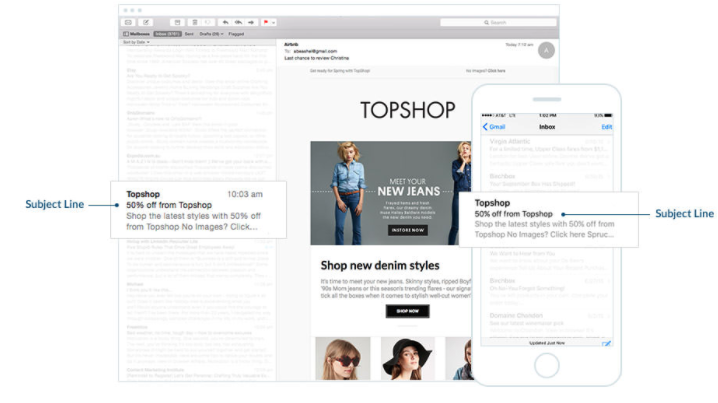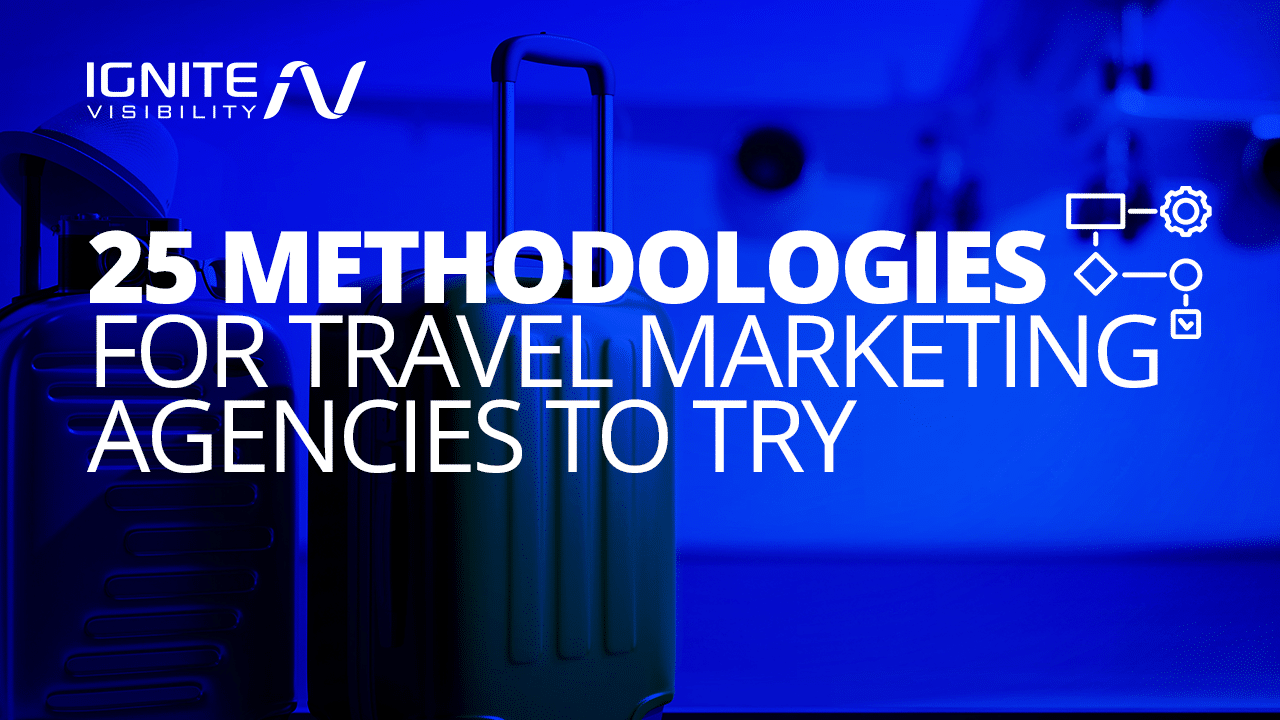
Travel marketing is essential in the tourism industry, offering travel agencies a competitive edge. It involves identifying target audiences, creating impactful marketing materials, and measuring performance across channels.
A travel marketing agency can effectively showcase your services and destinations, enhancing direct connections with audiences. Learn how to leverage travel marketing strategies in this guide to travel marketing agencies.
What You’ll Learn:
- 5 Travel Marketing Trends
- Travel Marketing: PPC Strategies
- Travel Marketing: Email Strategies
- Travel Marketing: Social Media Strategies to Try
- Travel Marketing and SEO
- Travel Marketing: Conversion Rate Optimization
Travel Marketing: Industry Trends
Before jumping into digital marketing for the travel industry, let’s look at some industry trends that might inform that strategy:
- Authentic Experiences: Travelers increasingly seek authentic, local experiences, favoring unique sights over mainstream tourism.
- Remote Work Travel: Post-pandemic, there’s a rise in remote workers traveling for both business and leisure, blending work and travel.
- Solo Travel Among Millennials: A growing trend, especially among Millennials, is the desire for annual solo travel adventures.
- Virtual Vacations: Advances in technology are making virtual travel experiences more accessible, allowing exploration from home.
- Eco-Conscious Travel: Environmental awareness is shaping travel choices, from sustainable transportation to eco-friendly destinations.
Travel Marketing: PPC Strategies
PPC (Pay-per-click) advertising is beneficial for all businesses, particularly in travel marketing, where selecting the right keywords is crucial for reaching your target audience.
PPC offers immediate visibility and the potential to generate quick bookings and sales, making it a highly effective channel for promoting limited-time offers and last-minute deals.
Although travel marketing benefits from the inherent appeal of its product, there are strategies to maximize your paid advertising budget’s effectiveness:
1. Create Irresistible Travel Marketing Ads
When crafting PPC ads in travel marketing, it’s crucial to utilize your selling points effectively. Follow these best practices for creating impactful ads:
- Include the target keyword in the headline
- Use call-to-action words like “Book Flights Now”
- Provide social proof, like the number of customers served
- Show starting prices for rooms or flights
- Create urgency by showing deadlines for deals
2. Use Niche-Focused Keywords to Stand Out
What sets your travel-related property apart?
Whether it’s a cosmopolitan hotel near popular bars, exclusive yacht charters, windsurfing classes, or adventurous jungle treks, identifying your unique selling points is crucial.
Travel marketing offers a spectrum from adventure to luxury and relaxation. Success hinges on highlighting what you excel at.
Determine your distinct edge over competitors. This differentiation is the foundation for selecting effective keywords and crafting compelling content. Failing to pinpoint and capitalize on your unique offerings could lead to competitors outranking you and attracting more customers.
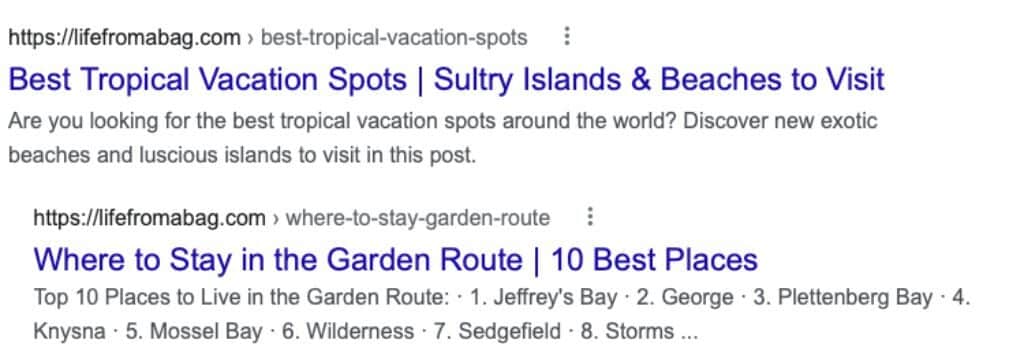
Niche Focused Keywords and Content
3. Change Your Keywords With the Season
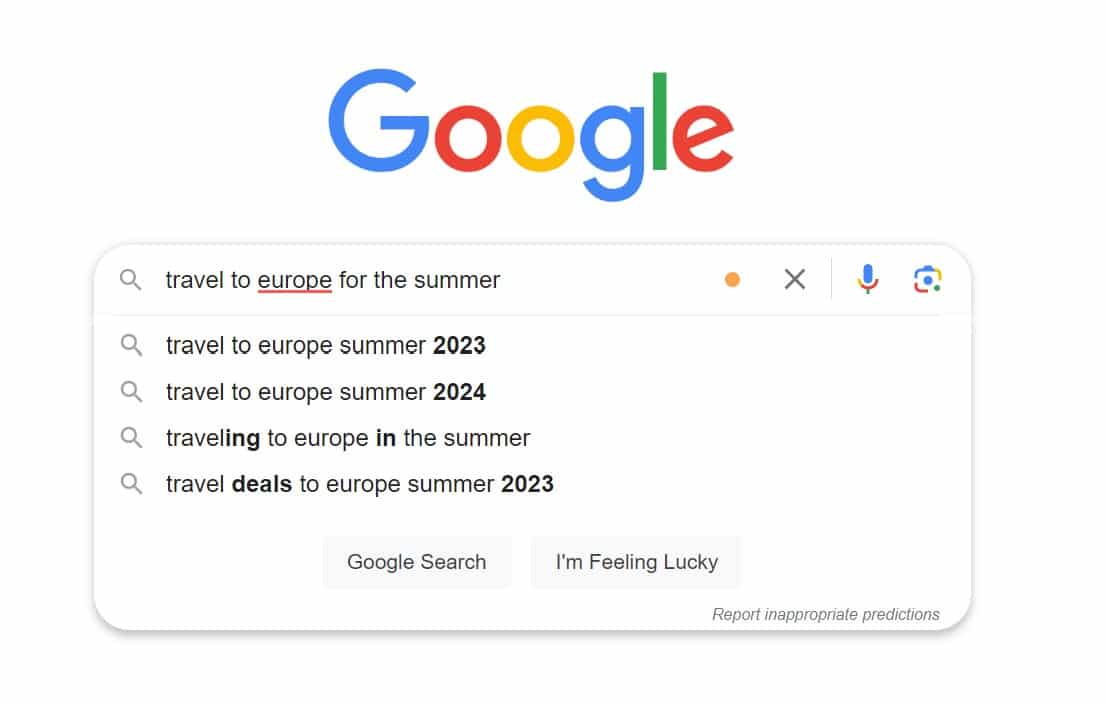
Google search for “travel to europe for the summer”
Travel PPC is all about seasonality and timing.
Before launching time-sensitive deals, identify the peak periods when customers are most active. Then, tailor your keywords to attract travelers looking for a summer getaway or a winter retreat, maximizing your ad budget’s efficiency.
4. Use Negative Keywords
For optimal results in a travel agency’s marketing strategy, incorporating negative keywords in PPC campaigns is essential.
Negative keywords, which are terms you choose not to target, help refine your ad reach, ensuring they are seen by the most relevant audience.
For example, in a luxury travel campaign, using ‘cheap’ or ‘hostel’ as negative keywords ensures your ads won’t appear to users searching for budget options, aligning your ads more closely with your target market.
5. Stick to Long-Tail Keywords in Your Travel Marketing Ads
If you want to stay competitive and reach more specific audiences, include long-tail keywords in your PPC ads.
Long-tail terms consist of three or more words to form a phrase or sentence that people enter into search engines.
For instance, you might use long-tail terms like “best deals on holiday travel packages to Europe” in an ad as opposed to targeting broad terms like “Europe travel.”
You can use various keyword tools to find some low-competition long-tail terms that yield worthwhile search volumes.
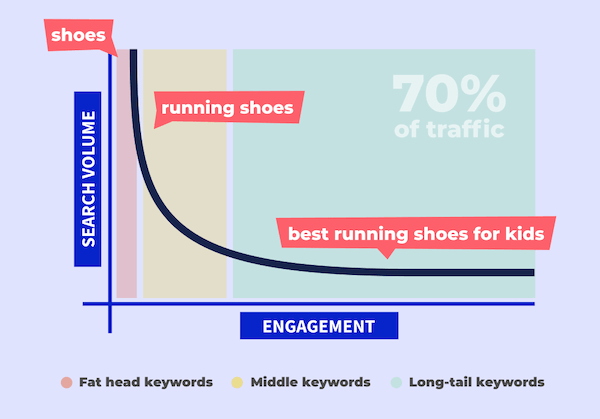
Example of Long Tail Keywords
Travel Marketing: Email Strategies
Email marketing remains a vital and targeted tool in the travel industry, known for its cost-effectiveness in reaching guests and boosting bookings. To keep subscribers engaged and encourage sharing, it’s essential to craft compelling content with attractive offers and deliver them at optimal times.
Key insights from leading travel marketing companies on maximizing email marketing effectiveness include:
1. Grow Your Subscriber List
Capturing the contact information of visitors already on your travel website can be challenging.
To effectively grow your email list, implement these strategies:
- Emphasize the benefits of subscribing, such as exclusive deals or valuable travel tips
- Ensure the opt-in feature is easily accessible and visible
- Employ content upgrades and lead magnets, like downloadable travel guides, to entice sign-ups
- Optimize call-to-action (CTA) buttons for higher engagement
- Utilize exit pop-ups as a last opportunity to encourage subscription
- Incorporate social sharing buttons in emails to expand reach
2. Target Repeat Guests with Behavioral Triggered Emails
Targeting existing customers is easier than trying to generate new leads all the time, and it’s more cost-effective.
Try behavioral-triggered emails! Use personalized email messages sent to users based on their past interactions or behaviors, such as website visits, product views, or abandoned shopping carts.
Think of special packages or time-sensitive reward offers.
These emails are highly effective because they are timely and relevant, addressing the user’s specific interests or actions, which increases engagement, conversion rates, and customer satisfaction.
They automate the process of reaching out to users based on their actions, saving time and resources, and can significantly improve the overall effectiveness of your email marketing campaigns.
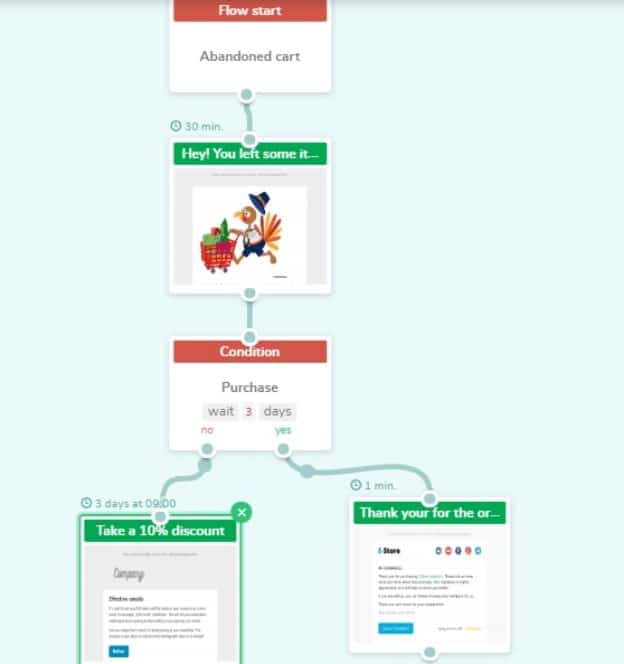
Behaviorally-Targeted Email Sequence
3. Take Advantage of Peak Times
Guests are more likely to look for deals in the lead-up to peak periods.
Send them personalized reminders with holiday-themed emails or last-chance summer vacation deals.
If your audience spans different time zones, sending emails at an appropriate time for each segment ensures that everyone receives the email when it’s most convenient for them.
Consider the timing of your competitors’ emails. Sending your email when there is less inbox competition can improve your chances of standing out.
4. Use Data to Create Hyper-Personalized Offers
Most travel bookings occur online, where customers expect to provide email and personal details.
Leverage this information for post-booking communication, including confirmations, reminders, and time-sensitive offers, facilitating upselling and increased revenue. Additionally, this data enables you to present personalized offers, crucial for customer engagement and loyalty.
Personalization is a key strategy. Reports, like Twilio’s 2023 study, show that 56% of consumers are more likely to become repeat customers through personalized interactions. An American Express study found that 83% of millennials prefer travel companies that offer tailored experiences, even if it involves tracking their patterns.
Further enhance personalization by tailoring email content to individual user preferences, focusing on features of services or locations that align with their interests.
This approach can guide users to specific landing pages with content most likely to engage them, deepening the connection with both potential and existing customers.
5. Create Unique Subject Lines
Short copy often takes a lot longer to perfect than longer pieces of content. Subject lines should be short, direct, and contain a clear benefit that encourages customers to open.
Once inside, the email must keep readers engaged. So, make sure your emails are friendly and personalized—and contain incentives. A few examples:
- Request feedback in exchange for a discount
- Invite customers to book directly on your website for a discount or a chance to win a prize
- Time-sensitive offers or rewards that encourage guests to book now
Crafting succinct copy, particularly for email subject lines, requires precision. They should be brief, and direct, highlighting a benefit that prompts customers to open the email.
Inside, maintaining engagement is crucial. Ensure your emails are friendly and personalized, and include incentives to spur action. Examples include:
- Offering discounts in exchange for customer feedback
- Inviting direct bookings on your website with discounts or prize opportunities
- Presenting time-sensitive offers or rewards that encourage immediate bookings
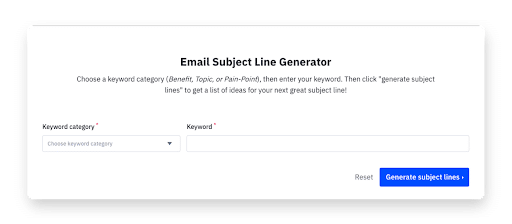
Email Subject Line Generator
Travel Marketing: Social Media Strategies to Try
Social media can be the key to connecting with your audiences with the help of a travel marketing agency.
Start using your platform to showcase visually appealing destinations and experiences, engaging potential travelers through enticing visuals and storytelling.
Additionally, social media allows for direct interaction with customers, enabling real-time engagement, customer support, and the opportunity to build a loyal community of travelers.
Here are some tips for using social media in digital marketing for the travel industry:
1. Utilize User Generated Content
A good travel marketing company knows that UGC is one of the best ways to create endless content.
To foster UGC, initiate a campaign using a branded hashtag specific to your agency.
Promote this hashtag across platforms, encouraging clients to share their travel experiences and media tied to your services. When customers share captivating photos or videos from their travels, these can be linked to your brand, enriching your travel marketing campaigns.
2. Use Imagery and Video in Your Travel Marketing Social Media Strategy
Vivid travel images and videos on your website and social media play a crucial role in influencing potential customers’ booking decisions.
Enhance your marketing strategy by incorporating videos. While photos capture attention, videos offer a comprehensive view of destinations, rooms, and facilities, providing a more immersive experience.
For instance, Dubai’s Atlantis the Palm effectively utilizes video to showcase its amenities. These videos give potential guests a feel for experiences like swimming with dolphins or exploring the resort, significantly enhancing the appeal of the destination.
3. Influencer Marketing
5. Host a Contest or Giveaway
Hosting contests and giveaways can create a positive association between your brand and the feelings of excitement and generosity. People are more likely to remember and favor brands that provide enjoyable experiences.
Not only do contests and giveaways foster engagement, but they also help you grow your customer base by collecting valuable data.
When hosting a contest or giveaway be sure to:
- Define clear objectives and rules
- Explicitly state requirements and deadlines
- Create compelling and visually appealing content
Travel Marketing and SEO
Search engine optimization (SEO) is a long-term digital marketing practice that involves keyword research, content creation, link building, and more.
SEO helps travel companies enhance their online visibility and attract targeted traffic, making it a cost-effective way to compete in the travel industry.
Try some of these SEO strategies:
1. Start a Blog
Starting a blog is highly beneficial for travel businesses, providing customers with engaging content beyond just sales.
Travel marketing agencies play a key role in enhancing your blog’s visibility through SEO strategies, including keyword optimization and link building.
High-quality, enjoyable content not only boosts search engine rankings across various topics but also positions your business as a trusted authority in the travel industry.
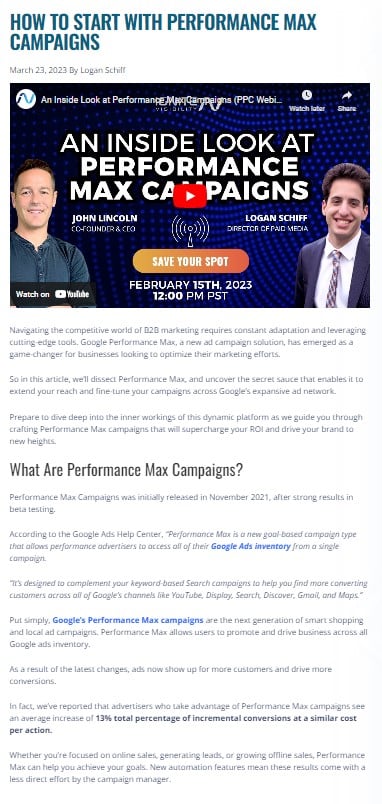
Example of Blog
2. Quality Beats Quantity
In travel marketing, blogging isn’t about producing vast quantities of content; it’s about creating posts that are both informative and inspirational. You’re selling the dream of a fantastic vacation, and your content should reflect this vision.
Exceptional content should either present a new story or tell an existing one in a way that surpasses others. Generic posts about popular destinations like Amsterdam or Disney won’t suffice. Instead, your blog should cater to your specific niche and showcase what makes your offerings unique and appealing.
3. Make It Easy To Get In Touch
Ensuring easy access to contact information is crucial for travel marketing. Follow these steps:
- Place contact details on every page
- Include an enticing CTA button for direct communication
- Offer multiple contact methods: phone, email, chat, and social media
4. Ensure Your GBP (Google Business Profile) is Accurate
Having a Google Business Profile is an essential piece of any SEO strategy for a travel agency. Ensure it includes complete contact details, business information, and physical location directions.
You should also build a Google Business Profile (GBP) to further differentiate your travel agency. This profile includes all contact details and other relevant information about your business, along with directions to your physical locations.
Ultimately, a GBP with accurate contact details can help fully optimize your digital presence for a better travel marketing strategy.
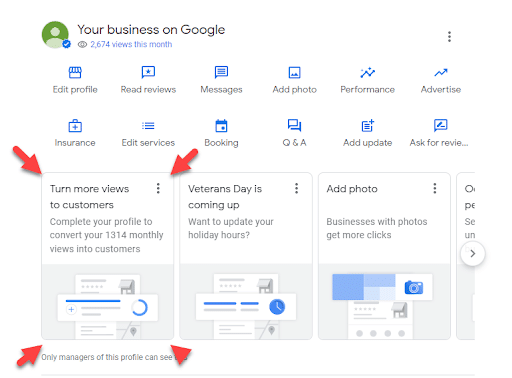
Google Business Profile Manager
5. Use Local SEO Keywords for Travel Marketing
Besides optimizing your website and GBP, you can rely on local SEO to help you compete with other local travel companies and businesses.
Stand out in local searches by creating content around “near me” search terms as well as location-based keywords, branded keywords, localized variations of keywords, and more.
While it’s not SEO, exploring geo-targeted ads will help you reach customers who are in your vicinity, taking advantage of location-specific campaigns.
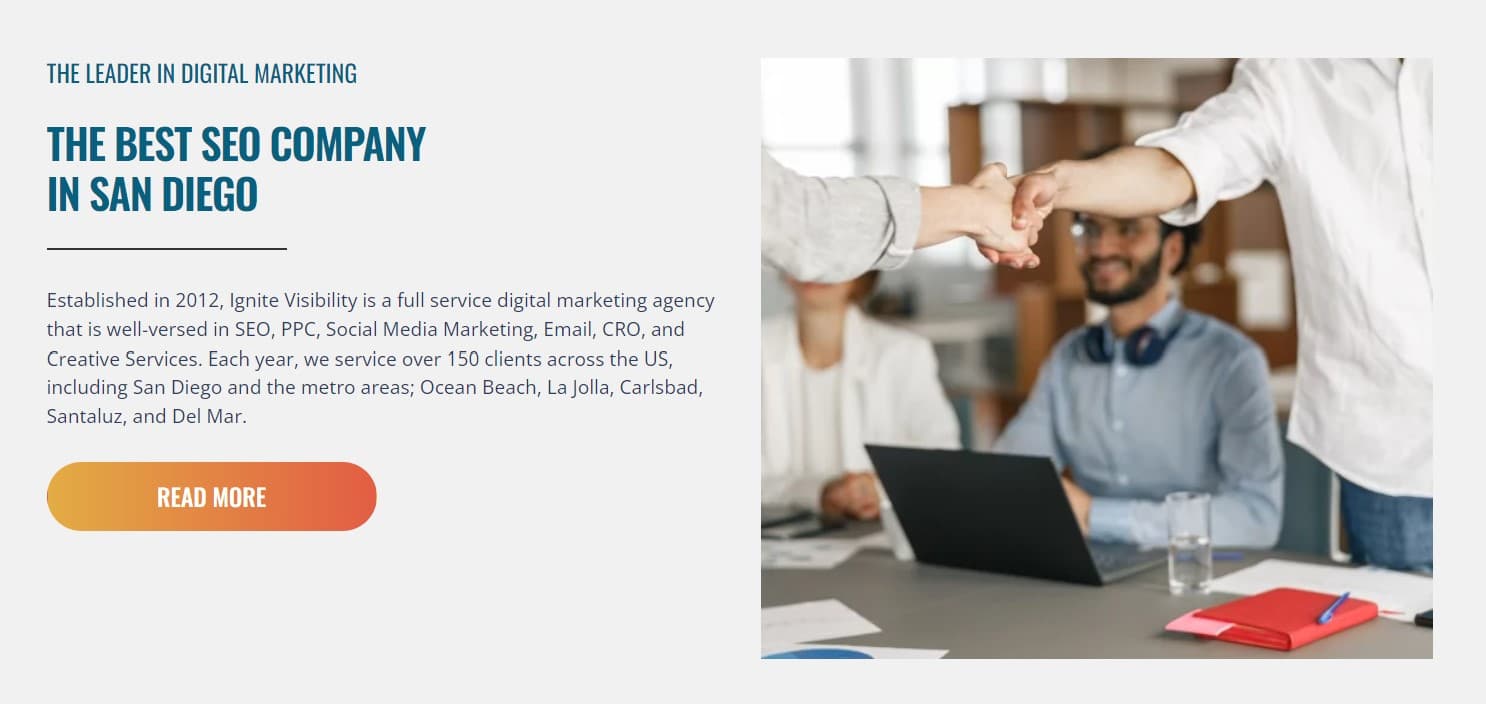
Example of Using Landmarks for “Near Me” SEO Searches
Travel Marketing with Conversion Rate Optimization
Conversion Rate Optimization (CRO) is crucial in travel marketing as it directly impacts the ability to convert website visitors into paying customers, maximizing the return on marketing investments.
By optimizing the user experience and streamlining the booking process, CRO ensures a more effective and satisfying customer journey. This leads to increased bookings and revenue, making CRO an indispensable part of successful travel marketing strategies.
Start implementing these strategies to improve your travel marketing CRO:
1. Develop a Killer Mobile Experience
Mobile optimization is essential in travel marketing. Booking.com reports that 59% of travel bookings are made on mobile devices, with research often conducted via smartphones and tablets.
For a seamless mobile experience, ensure your website adheres to these principles:
- Web copy should be readable with appropriate spacing, fonts, and colors
- Enable click-to-call functionality for easy contact
- Integrate Google Maps for location guidance
- Avoid using Adobe Flash
- Minimize pop-up use to enhance user experience
- Ensure the logo links back to the homepage
- Make calendar and search functions easily accessible
- Use auto-fill on forms for returning customers
2. Keep UX at the Forefront of Your Website
Ensure a streamlined User Experience (UX) that is simple, clear, and concise. Your website should be easy to navigate, enhancing the customer journey.
Be sure to:
- Design a mobile-friendly interface for various devices
- Maintain a loading speed of two seconds or less
- Developing a multilingual site for global visitors
- Creating an intuitive web design for a seamless user journey
3. Make Booking Seamless
Additionally, implement a smart booking engine that syncs room and pricing information across all platforms.
This ensures consistency, whether bookings are made online or via mobile, providing a clear and updated overview for every visitor.
Minimize the number of steps to book, offering clear calls-to-action, easy navigation, and providing various secure payment options.
4. Rely on A/B Testing to Show You What Works (And What Doesn’t)
Regularly conducting A/B testing on key travel website elements like landing pages, headlines, and calls-to-action will help you determine what works best in engaging and converting visitors.
Coupled with in-depth analytics, this strategy helps in understanding user behavior and preferences, allowing for continuous improvement of the user experience and conversion rate.
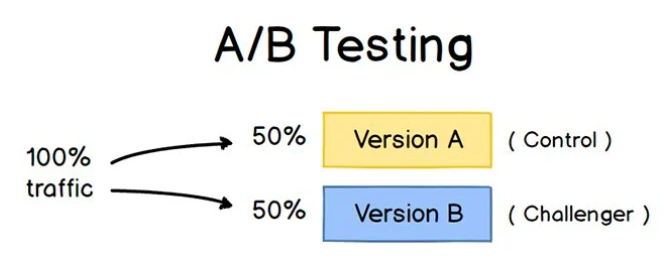
What is A/B testing?
5. Incorporate Social Proof with Customer Reviews
Encouraging guests to leave online reviews is vital in travel marketing. Avoid offering incentives as this may appear as buying positive reviews.
Instead, simplify the review process. Use tools like TripAdvisor’s widget for easy onsite feedback, and Yelp’s Review Badges to display positive reviews as a visual prompt, along with a call-to-action (CTA) linking to your Yelp page.
Addressing negative reviews is also crucial. Ignoring them can create a negative impression, as seen on Expedia’s Trust Pilot page. Responding to complaints shows customers they are valued and can transform negative experiences into positive ones.
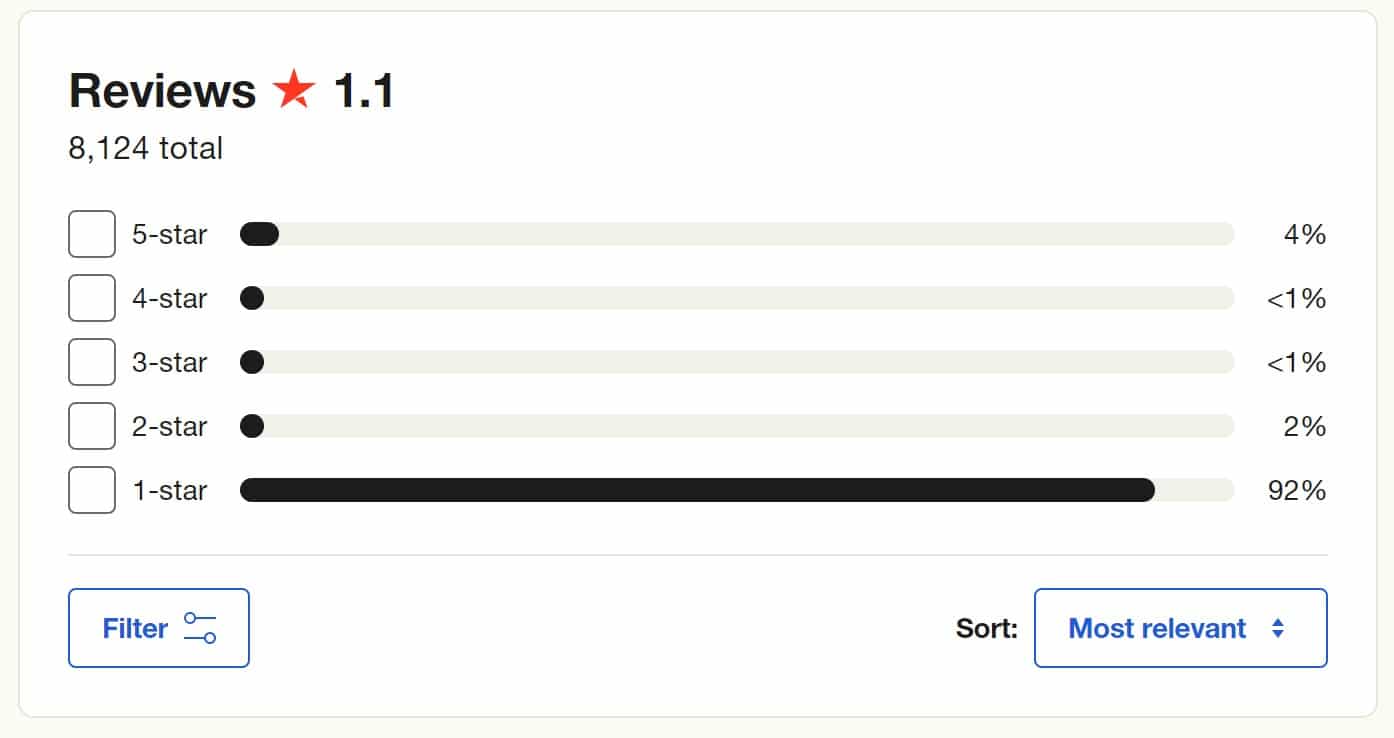
Poor Negative Reviews
Partner with Ignite Visibility for Travel Marketing
As you can see, successful travel marketing depends on implementing a wide range of strategies from PPC to video, to making sure your site is optimized for mobile bookings.
Employ these tips listed above, and you’ll have a top travel marketing company in no time.
Want to get the best results with your travel marketing approach? Turn to a reliable digital marketing agency for travel businesses and get the help you need.
At Ignite Visibility, we can help you with everything from search engine optimization and PPC to email marketing to build a complete travel marketing campaign based on your unique requirements.
In doing so, we’ll help:
- Locate and reach your target market
- Develop fully optimized campaigns that get results
- Continually monitor and measure performance
- Perfect your efforts to get increasingly great results
If that sounds like a plan, reach out to the experts at Ignite Visibility for help today!
